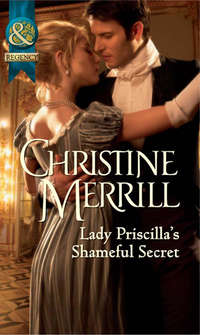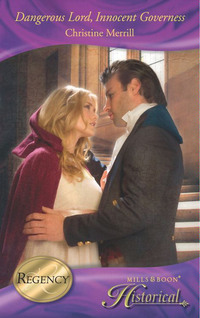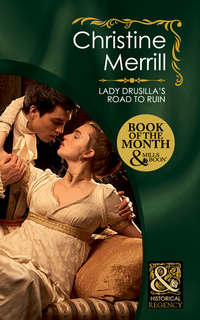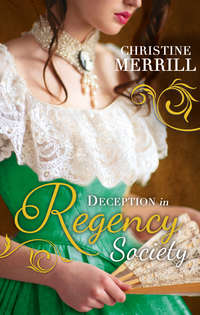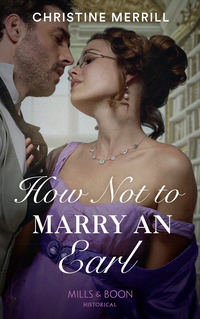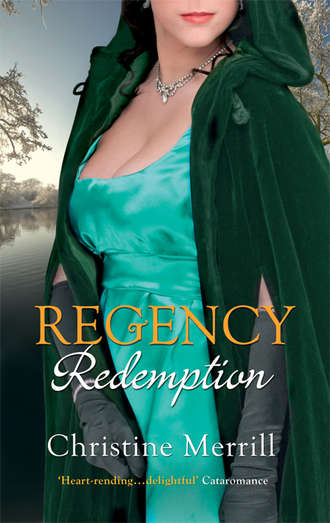
Полная версия
Regency Redemption: The Inconvenient Duchess / An Unladylike Offer

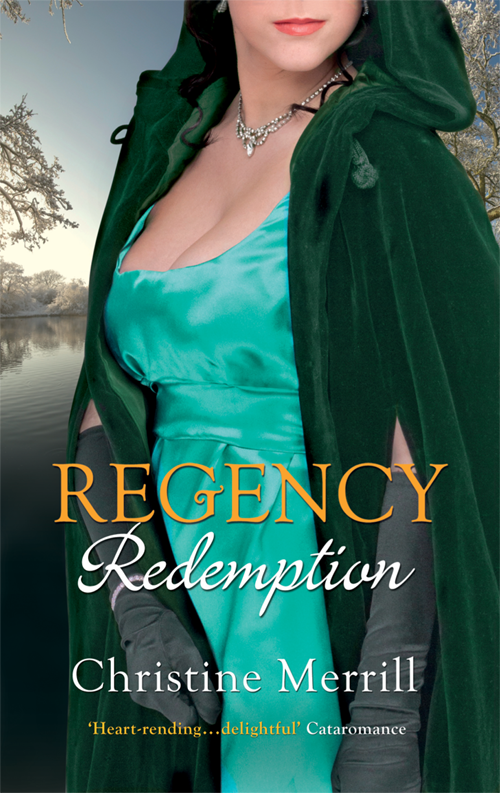
REGENCY Redemption
The Inconvenient Duchess
An UnladylikeOffer
Christine Merrill

www.millsandboon.co.uk
About the Author
CHRISTINE MERRILL lives on a farm in Wisconsin, USA, with her husband, two sons, and too many pets—all of whom would like her to get off the computer so they can check their e-mail.
She has worked by turns in theatre costuming, where she was paid to play with period ballgowns, and as a librarian, where she spent the day surrounded by books. Writing historical romance combines her love of good stories and fancy dress with her ability to stare out of the window and make stuff up.
Don’t miss these other Regency delights from Mills & Boon ® Historical romance’s bestselling authors!
REGENCY PLEASURES
Louise Allen
REGENCY SECRETS
Julia Justiss
REGENCY RUMOURS
Juliet Landon
REGENCY REDEMPTION
Christine Merrill
REGENCY DEBUTANTES
Margaret McPhee
REGENCY IMPROPRIETIES
Diane Gaston
REGENCY MISTRESSES
Mary Brendan
REGENCY REBELS
Deb Marlowe
REGENCY SCANDALS
Sophia James
REGENCY MARRIAGES
Elizabeth Rolls
REGENCY INNOCENTS
Annie Burrows
REGENCY SINS
Bronwyn Scott
The Inconvenient Duchess
Christine Merrill
To Jim, who knows I’m crazy,
but loves me anyway. And to James and Sean.
Making your own breakfasts and mating your own socks
builds character. You’ll thank me later, but I thank you now.
Chapter One

‘Of course, you know I am dying.’ His mother extended slim fingers from beneath the bedclothes and patted the hand that he offered to her.
Marcus Radwell, fourth Duke of Haughleigh, kept his face impassive, searching his mind for the appropriate response. ‘No.’ His tone was neutral. ‘We will, no doubt, have this conversation again at Christmas when you have recovered from your current malady.’
‘Only you would use obstinacy as a way to cheer me on my deathbed.’
And only you would stage death with such Drury Lane melodrama. He left the words unspoken, struggling for decorum, but glared at the carefully arranged scene. She’d chosen burgundy velvet hangings and dim lighting to accent her already pale skin. The cloying scent of the lilies on the dresser gave the air a funereal heaviness.
‘No, my son, we will not be having this conversation again. The things I have to tell you will be said today. I do not have the strength to tell them twice, and certainly will not be here at Christmas to force another promise from you.’ She gestured to the water glass at the bedside. He filled it and offered it to her, supporting her as she drank.
No strength? And yet her voice seemed steady enough. This latest fatal illness was probably no more real than the last one. Or the one before. He stared hard into her face, searching for some indication of the truth. Her hair was still the same delicate blonde cloud on the pillow, but her face was grey beneath the porcelain complexion that had always given her a false air of fragility. ‘If you are too weak … perhaps later …’
‘Perhaps later I will be too weak to say them, and you will not have to hear. A good attempt, but I expected better.’
‘And I expected better of you, Mother. I thought I had made it clear, on my last visit to your deathbed—’ the word was heavy with irony he could no longer disguise ‘—that I was tired of playing the fool in these little dramas you insist on arranging. If you want something of me, you could at least do me the courtesy of stating it plainly in a letter.’
‘So that you could refuse me by post, and save yourself the journey home?’
‘Home? And where might that be? This is your home. Not mine.’
Her laugh was mirthless and ended in a rasping cough. Old instincts made him reach out to her before he caught himself and let the hand fall to his side. The coughing ended abruptly, as though his lack of sympathy made her rethink her strategy.
‘This is your home, your Grace, whether you choose to live in it or not.’
So if fears for her health would not move him, perhaps guilt over his neglected estate? He shrugged.
Her hand trembled as she gestured towards the nightstand, and he reached for the carafe to refill her glass. ‘No. The box on the table.’
He passed the inlaid box to her. She fumbled with the catch, opened it and removed a stack of letters, patting them. ‘As time grows short, I’ve worked to mend the mistakes in my past. To right what wrongs I could. To make peace.’
To get right with the Lord before His inevitable judgement, he added to himself and clenched his jaw.
‘And recently, I received a letter from a friend of my youth. An old school companion who was treated badly.’
He could guess by whom. If his mother was planning to right her wrongs chronologically, she had better be quick. Even if she lived another twenty years, as he suspected she might, there were wrongs enough in her past to fill the remaining time.
‘There were money problems, as there so often are. Her father died penniless. She was forced home and had to find her own way in the world. She has been, for the last twelve years, a companion to a young girl.’
‘No.’ His voice echoed in the still sickroom.
‘You say no, and, as yet, I have asked no questions.’
‘But you most certainly will. The young girl will turn out to be of marriageable age and good family. The conversation will be about the succession. The question is inevitable and the answer will be no.’
‘I had thought to see you settled before I died.’
‘Perhaps you shall. I am sure we have plenty of time.’
She continued as if there had been no interruption. ‘I let you wait, assuming you would make a choice in your own good time. But I have no time. No time to let you handle things. Certainly no time to let you wallow in grief for losses and mistakes that are ten years past.’
He bit off the retort that was forming on his tongue. She was right in this at least. He needn’t reopen his half of an old argument.
‘You are right. The girl is of marriageable age, but her prospects are poor. She is all but an orphan. The family lands are mortgaged and gone. She has little hope of making a match, and Lady Cecily despairs of her chances. She fears that her charge is destined for a life of service and does not wish to see her own fate visited on another. She has approached me, hoping that I might help …’
‘And you offered me up as a sacrifice to expiate the wrong you did forty years ago.’
‘I offered her hope. Why should I not? I have a son who is thirty-five and without issue. A son who shows no sign of remedying this condition, though his wife and heir are ten years in the grave. A son who wastes himself on whores when he should be seeing to the estate and providing for the succession. I know how quickly life passes. If you die, the title falls to your brother. Have you considered this, or do you think yourself immortal?’
He forced a smile. ‘Why does it matter to you now? If St John inherited the title, it would please you above all things. You’ve made no effort to hide that he is your favourite.’
She smiled back, with equal coldness. ‘I am a fond old woman, but not as foolish as all that. I will not lie and call you favourite. But neither will I claim that St John has the talent or temperament to run this estate. I can trust that once you are settled here, you will not lose your father’s coronet at cards. Your neglect of your duties is benign, and easily remedied. But can you imagine the land after a year in your brother’s care?’
He closed his eyes and felt the chill seeping through his blood. He did not want to imagine his brother as a duke any more than he wanted to imagine himself chained to a wife and family and trapped in this tomb of a house. There were enough ghosts here, and now his mother was threatening to add herself to the list of grim spirits he was avoiding.
She gave a shuddering breath and coughed.
He offered her another sip of water and she cleared her throat before speaking again. ‘I did not offer you as a sacrifice, however much pleasure you take in playing the martyr. I suggested that she and the girl visit. That is all. From you, I expect a promise. A small boon, not total surrender. I would ask that you not turn her away before meeting her. It will not be a love match, but I trust you to realise, now, that love in courtship does not guarantee a long or a happy union. If she is not deformed, or ill favoured, or so hopelessly stupid as to render her company unbearable, I expect you to give serious thought to your offer. Wit and beauty may fade, but if she has common sense and good health, she has qualities sufficient to make a good wife. You have not, as yet, married some doxy on the continent?’
He glared at her and shook his head.
‘Or developed some tragic tendre for the wife of a friend?’
‘Good God, Mother.’
‘And you are not courting some English rose in secret? That would be too much to hope. So this leaves you with no logical excuse to avoid a meeting. Nothing but a broken heart and a bitter nature, which you can go back to nurturing once an heir is born and the succession secured.’
‘You seriously suggest that I marry some girl you’ve sent for, on the basis of your casual correspondence with an old acquaintance?’
She struggled to sit upright, her eyes glowing like coals in her ashen face. ‘If I had more time, and if you weren’t so damned stubborn, I’d have trotted you around London and forced you to take your pick of the Season long ago. But time is short, and I am forced to make do with what can be found quickly and arranged without effort. If she has wide hips and an amiable nature, overcome your reservations, wed, and get her with child.’
And she coughed again. But this time it was not the delicate sound he was used to, but the rack of lungs too full to hold breath. And it went on and on until her body shook with it. A maid rushed into the room, drawn by the sound, and leaned over the bed, supporting his mother’s back and holding a basin before her. After more coughing she spat and sagged back into the pillows, spent. The maid hurried away with the basin, but a tiny fleck of blood remained on his mother’s lip.
‘Mother.’ His voice was unsteady and his hand trembled as he touched his handkerchief to her mouth.
Her hand tightened on his, but with little strength. He could feel the bones through the translucent skin.
When she spoke, her voice was a hoarse whisper. The glow in her eyes had faded to a pleading, frightened look that he had not seen there before. ‘Please. Before it is too late. Meet the girl. Let me die in peace.’ She smiled in a way that was more a grimace, and he wondered if it was from pain. She’d always tried to keep such rigid control. Of herself. Of him. Of everything. It must embarrass her to have to yield now. And for the first time he noticed how small she was as she lay there and smelled the hint of decay masked by the scent of the lilies.
It was true, then. This time she really was dying.
He sighed. What harm could it do to make a promise now, when she would be gone long before he needed to keep it? He answered stiffly, giving her more cause to hope than he had in years. ‘I will consider it.’
Chapter Two

The front door was oak, and when she dropped the heavy brass knocker against it, Miranda Grey was surprised that the sound was barely louder than the hammering of the rain on the flags around her. It would be a wonder if anyone heard her knock above the sound of the late summer storm.
When the door finally opened, the butler hesitated, as though a moment’s delay in the rain might wash the step clean and save him the trouble of seeing to her.
She was afraid to imagine what he must see. Her hair was half down and streaming water. Her shawl clung to her body, soaked through with the rain. Her travelling dress moulded to her body, and the mud-splattered skirts bunched between her legs when she tried to move. She offered a silent prayer of thanks that she’d decided against wearing slippers or her new pair of shoes. The heavy boots she’d chosen were wildly inappropriate for a lady, but anything else would have disintegrated on the walk to the house. Her wrists, which protruded from the sleeves of the gown before disappearing into her faded gloves, were blue with cold.
After an eternity, the butler opened his mouth, probably to send her away. Or at least to direct her to the rear entrance.
She squared her shoulders and heard Cici repeating words in her mind.
‘It is not who you appear to be that matters. It is who you are. Despite circumstances, you are a lady. You were born to be a lady. If you remember this, people will treat you accordingly.’
Appreciating her height for once, she stared down into the face of the butler and said in a tone as frigid as the icy rainwater in her boots, ‘Lady Miranda Grey. I believe I am expected.’
The butler stepped aside and muttered something about a library. Then, without waiting for an answer, he shambled off down the hall, leaving her and her portmanteau on the step.
She heaved the luggage over the threshold, stepped in after it, and pulled the door shut behind her. She glanced down at her bag, which sat in its own puddle on the marble floor. It could stay here and rot. She was reasonably sure that it was not her job to carry the blasted thing. The blisters forming beneath the calluses on her palms convinced her that she had already carried it quite enough for one night. She abandoned it and hurried after the butler.
He led her into a large room lined with books and muttered something. She leaned closer, but was unable to make out the words. He was no easier to understand in the dead quiet of the house than he had been when he’d greeted her at the door. Then he wandered away again, off into the hall. In search of the dowager, she hoped. In his wake, she detected a faint whiff of gin.
When he was gone, she examined her surroundings in detail, trying to ignore the water dripping from her clothes and on to the fine rug. The house was grand. There was no argument to that. The ceilings were high. The park in front was enormous, as she had learned in frustration while stumbling across its wide expanse in the pouring rain. The hall to this room had been long, wide and marble, and lined with doors that hinted at a variety of equally large rooms.
But …
She sighed. There had to be a but. A house with a peer, but without some accompanying problem, some unspoken deficit, would not have opened its doors to her. She stepped closer to the bookshelves and struggled to read a few of the titles. They did not appear to be well used or current—not that she had any idea of the fashion in literature. Their spines were not worn; they were coated with dust and trailed the occasional cobweb from corner to corner. Not a great man for learning, the duke.
She brightened. Learning was not a requirement, certainly. A learned man might be too clever by half and she’d find herself back out in the rain. Perhaps he had more money than wit.
She stepped closer to the fire and examined the bricks of the hearth. Now here was an area she well understood. It left a message much more readable than the bookshelves. There was soot on the bricks that should have been scrubbed away long ago. She could see the faint smudges on the walls, signs that the room was long overdue for a good cleaning. She rustled the heavy velvet of the draperies over the window, then sneezed at the dust and slapped at the flutter of moths she’d disturbed.
So, the duke was not a man of learning, and the dowager had a weak hand on the servants. The butler was drunk and the maids did not waste time cleaning the room set aside to receive guests. Her hands itched to straighten cushions, to beat dust out of velvet and to find a brush to scrub the bricks. Didn’t these people understand what they had? How lucky they were? And how careless with their good fortune?
If she were mistress of this house …
She stopped to correct herself. When she was mistress of this house. That was how Cici would want her to think. When, not if. Her father was fond of myths and had often told her stories of the Spartan soldiers. When they went off to war, their mothers told them to come back with their shields or on them. And her family would have the same of her. Failure was not an option. She could not disappoint them.
Very well, she decided. When she was mistress of this house, things would be different. She could not offer his Grace riches. But despite the dirt, the house and furnishings proved he did not need money. She was not a great beauty, but who would see her here, so far from London? She lacked the refinements and charms of a lady accustomed to society, but she’d seen no evidence that his Grace enjoyed entertaining. She had little learning, but the dust on his library showed this was not his first concern.
What she could offer were the qualities he clearly needed. Household management. A strong back. A willingness to work hard. She could make his life more comfortable.
And she could provide him an heir.
She pushed the thought quickly from her mind. That would be part of her duties, of course. And, despite Cici’s all-too-detailed explanations of what this duty entailed, she was not afraid. Well, not very afraid. Cici had told her enough about his Grace, the Duke of Haughleigh, to encourage her on this point. He was ten years a widower, so perhaps he would not be too demanding. If his needs were great, he must surely have found a means to satisfy them that did not involve a wife. If his needs were not great, then she had no reason to fear him.
She’d imagined him waiting for her arrival, as she made the long coach ride from London. He was older than she, and thinner. Not frail, but with a slight stoop. Greying hair. She’d added spectacles, since they always seemed to make the wearer less intimidating. And a kind smile. A little sad, perhaps, since he’d waited so long after the death of his wife to seek a new one.
But he did not seek, she reminded herself. Cici had done all the seeking, and this introduction had been arranged with his mother. She added shy, to his list of attributes. He was a retiring country gentleman and not the terrifying rake or high-flyer that Cici had been most qualified to warn her about. She would be polite. He would be receptive. They would deal well together.
And when, eventually, the details of her circumstances needed to be explained, he would have grown so fond of her that he would accept them without qualms.
Without warning, the door opened behind her and she spun to face it. Her heart thumped in her chest and she threw away the image she’d been creating. The man in front of her was no quiet country scholar. Nor some darkly handsome, brooding rake. He entered the room like sunlight streaming through a window.
Not so old, she thought. He must have married young. And his face bore no marks of the grief, no lines of long-born sorrow. It was open and friendly. She relaxed a little and returned his smile. It was impossible not to. His eyes sparkled. And they were as blue as …
She faltered. Not the sky. The sky in the city had been grey. The sea? She’d never seen it, so she was not sure.
Flowers, perhaps. But not the sensible flowers found in a kitchen garden. Something planted in full sun that had no use but to bring pleasure to the viewer.
His hair was much easier to describe. It shone gold in the light from the low fire.
‘Well, well, well. And who do we have here?’ His voice was low and pleasant and the warmth of it made her long to draw near to him. And when she did, she was sure he would smell of expensive soap. And his breath would be sweet. She almost shivered at the thought that she might soon know for sure. She dropped a curtsy.
He continued to stare at her in puzzlement. ‘I’m sorry, my dear. You have the better of me. As far as I know, we weren’t expecting any guests.’
She frowned. ‘My guardian wrote to your mother. It was supposed to be all arranged. Of course, I was rather surprised when there was no one to meet the coach, but …’
He was frowning now, but there was a look of dawning comprehension. ‘I see. If my mother arranged it, that would explain why you expected …’ He paused again and began cautiously. ‘Did you know my mother well?’
‘Me? No, not at all. My guardian and she were school friends. They corresponded.’ She fumbled in her reticule and removed the damp and much-handled letter of introduction, offering it to him.
‘Then you didn’t know of my mother’s illness.’ He took the letter and scanned it, eyebrows raised as he glanced over at her. Then he slipped off his fashionable dark jacket and revealed the black armband tied about the sleeve of his shirt.
‘I’m afraid you’re six weeks too late to have an appointment with my mother, unless you have powers not possessed by the other members of this household. The wreath’s just off the door. I suppose it’s disrespectful of me to say so, but you didn’t miss much. At the best of times, my mother was no pleasure. Here, now …’
He reached for her as she collapsed into the chair, no longer heeding the water soaking into the upholstery from her sodden gown.
‘I thought, since you didn’t know her … I didn’t expect this to affect you so. Can I get you something … brandy …? Decanter empty again … Wilkins! Damn that man.’ He threw open the door and shouted down the hall, trying to locate the muttering butler. ‘Wilkins! Where’s the brandy?’
So she’d arrived dripping wet, unescorted and unexpected, into a house of mourning, with a dubious letter of introduction, expecting to work her way into the affections of a peer and secure an offer before he asked too many questions and sent her home. She buried her head in her hands, wishing that she could soak into the carpet and disappear like the rain trickling from her gown.
‘What the hell is going on?’ His Grace had found someone, but the answering voice in the hall was clearly not the butler. ‘St John, what is the meaning of shouting up and down the halls for brandy? Have you no shame at all? Drink the house dry if you must, but have the common decency to do it in quiet.’ The voice grew louder as it approached the open doorway.
‘And who is this? I swear to God, St John, if this drowned rat is your doing, be damned to our mother’s memory, I’ll throw you out in the rain, brandy and girl and all.’
Miranda looked up to find a stranger framed in the doorway. He was everything that the other man was not. Dark hair, with a streak of grey at each temple, and a face creased by bitterness and hard living. An unsmiling mouth. And his eyes were the grey of a sky before a storm. Strength and power radiated from him like heat from the fire.


